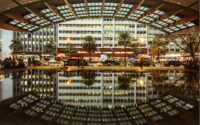Approved Destination Status with China and Transformation in South Africa
Background
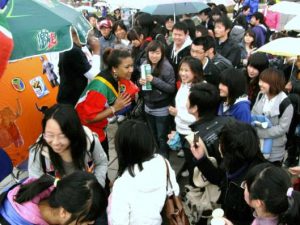
“Acceleration of transformation within tourism is at the center of our programs in the medium-term. We will continue to promote industry transformation and economic participation, especially among the historically marginalized. We will also promote the growth of small, medium, and microenterprises (SMMEs). Our objective is to ensure that the benefits of tourism are equitably shared amongst the citizens of our country.” – Deputy Minister of Tourism, Tokozile Xasa (Strategic Plan and Annual Performance Plan 2014/15 – 2018/19)
South Africa has successfully capitalized on its post-liberation status, steadily increasing the international market to 9,5 million tourists in 2014. Despite this phenomenal growth, the tourism industry is still characterized by large disparities in access to opportunities and benefits for historically disadvantaged communities.
It is also recognized that this sector remains largely inaccessible to the majority of black South Africans. The reality of the tourism industry mirrors the history of South Africa, where the development of business opportunities was largely denied to the majority of South Africans, who were unable to participate in the mainstream economy.
Approved Destination Status and Transformation
In his maiden speech as Minister of Tourism, Derek Hanekom acknowledged the initiation of a process of transformation but said one of his key objectives would be to grow tourism at the local government level and identify growth opportunities.
The granting of Approved Destination Status (ADS) by the Chinese government to South Africa was seen as a critical stimulus for the transformation of the South African tourism industry and the strengthening of the South African government’s ability to deliver on issues of poverty alleviation, job creation, and black economic empowerment.
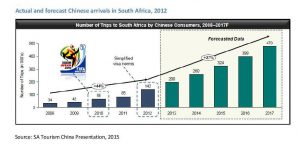
It was seen as the most important development since the democratization of South African society because the “tourism cake” has now grown (access to a new market) and emerging (“black”) entrepreneurs did not have to fight with the established (“white”) industry to share “their” part of the “tourism cake.”
Up until that point in time, emerging entrepreneurs found it difficult to access established markets (like the UK, USA, and Europe) because they were restricted by the entrenched relationships between foreign outbound operators and established South African inbound operators. Emerging markets, like China, therefore provided the perfect opportunity to capacitate, nurture, and mentor emerging entrepreneurs to enter a new source market due to the absence of established business relationships.
What is Approved Destination Status (ADS)
Approved Destination Status (ADS) is a bilateral agreement on tourism between China and South Africa that allows South Africa to market itself directly to the Chinese market. The agreement was signed by the then Deputy Minister of Environmental Affairs and Tourism, Rejoice Mabudafhasi, during November 2002 in Shanghai, China, and came into effect during 2003.
It was expected that approved destination status (ADS) would significantly boost travel to South Africa. The size of the Chinese outbound market during 2002 grew to more than 16 million, and the World Tourism Organization forecast an annual growth of 12%.
During 2006, Manqoba Nyembezi (then Tourism Attaché at the SA Embassy in China) was quoted as saying, “We are aiming for 2.5 million Chinese visitors every year to South Africa.” While the then-Deputy Minister of Environmental Affairs and Tourism, Rejoice Mabudafhasi, was quoted as saying, “We should once again be proud as South Africans, as this will mean a huge growth in our economy,” It will also mean that a number of jobs will be created for our jobless people.
Implications of Approved Destination Status (ADS) for South Africa
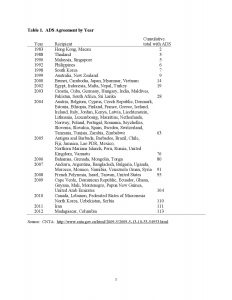
At the time, approved destination status (ADS) with China gave South Africa a competitive advantage over other African countries, which did not have ADS with China. South Africa was the second country in Africa to be declared an approved destination by the Chinese government, the first being Egypt.
SA Tourism, as South Africa’s international tourism marketing agency, was identified as the implementing agent, as agreed by the two governments. SA Tourism was to monitor and regulate business between the Chinese and South African tour operators (who would enter into contracts with other stakeholders in the tourism value chain) and ensure compliance with the ADS agreement.
Successful implementation of the Approved Destination Status Agreement required the implementation of training and skills development programs that aligned with the Previously Disadvantaged Individual and Enterprise (PDI/E) policies of the South African government. This recognized the basic fact that PDI/E tourism enterprises were not involved in this very specialized market.
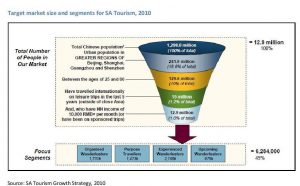
To protect PDI/E tourism enterprises and the South African economy, it was deemed essential that these PDI/E tourism enterprises be capacitated with skills to deliver on the challenges of Chinese outbound tourism to South Africa and ensure sustainable tourism growth. This required a commitment by all identified tour operators, in the form of a contract, to develop and use PDI/E products at a rate of no less than 40% within 3 years.
Contract with SA Tourism
ADS-accredited operators had to adhere to the “Guidelines for ADS Tour Operators” and comply with the “Criteria for Appointment as Official Inbound Tour Operators under the Approved Destination Status Agreement with China.” These accredited tour operators were also required to enter into a contract with SA Tourism.
In terms of the contract signed between the accredited tour operator and SA Tourism, the accredited tour operator had to indicate a willingness to develop previously disadvantaged individuals and enterprises (PDI/E) and utilize them in all tour packages in the form of joint ventures, skills transfers, capacity building, mentoring, and support.
The Previously Disadvantaged Individual (PDI) content for the accredited tour operators was set at a minimum of 40%, and the Black Economic Empowerment (BEE) component, also part of the contract, looked at equity distribution. In agreement with the Department of Trade and Industry, it was prescribed to be 25% within 3 years (from 2003 to 2006).
This was understood as a chance for growth, rather than a punitive measure, while introducing black capital to this growing market segment. Control was annual, as stipulated in the contract, against an implementation strategy that formed part of the contract. Over and above that, ADS tour operators also signed a code of conduct and ethics. Reviews were supposed to be done annually.
Initially, 25 inbound tour operators were selected. According to SA tourism, the process of selection was driven by guidelines using trade databanks. Professional skills, legal requirements, and tour operating experience in the China market were basic requirements, as well as a proven track record of engaging the Chinese market.
What level of transformation has been achieved in the South African tourism sector since the granting of Approved Destination Status by China, 15 years ago?
After two decades of economic growth, China has become the second-largest economy in the world. China is a key source market for South Africa. People from the Chinese mainland spent $215 billion traveling abroad in 2015, 53 percent more than in 2014, according to the World Travel and Tourism Council. This puts China ahead of the United States and other developed countries as the top global source of tourists.
The China National Tourism Administration and the United Nations World Tourism Organization report that Chinese tourists made a record 120 million trips overseas last year, which means that one in every 10 international travelers was from China. A total of 83,024 Chinese tourists visited South Africa during 2014.
During April 2016, the Minister of Tourism, Derek Hanekom, completed a three-day working visit to China to engage with the country’s travel and tourism business leaders. “We have had very useful discussions with the tourism trade, and several constructive ideas and plans have emerged,” said Minister Hanekom.
Over the past 15 years, since its implementation, Approved Destination Status (ADS) with China has presented an historic opportunity to transform the tourism industry and broaden the ownership base of the tourism economy, contribute to the growth objectives of the tourism industry and ultimately contribute to a decrease in the trade deficit with China.
Current situation
Currently, there are 24 (twenty-four) approved inbound tour operators who are responsible for handling Chinese outbound tourists in South Africa. None of the operators who were interviewed could produce BEE rating certificates from accredited rating agencies, and only a few of these businesses appeared to be truly South African owned and managed.
When questioned about the lack of utilization of BEE products in their tour packages, as well as their non-compliance with the ADS guidelines, the operators expressed their eagerness to engage BEE/PDI products and services and their willingness to adhere to the ADS guidelines. However, due to the lack of availability of BEE skills, products, and services to support the China inbound tourism market, as well as the lack of proper direction from SA Tourism with regard to compliance with the ADS guidelines, they are left with very few options. The inbound operators also indicated that they need support from either the Department of Tourism or SA Tourism on BEE compliance issues as well as adhering to the ADS guidelines.
In the opinion of the inbound operators, the responsibility to capacitate historically disadvantaged individuals as well as ensure the availability of BEE products and services to support the China inbound market rests with the Department of Tourism or SA Tourism. Numerous attempts to get a response from the Department of Tourism on the state of transformation in South Africa were unsuccessful. The SA Tourism office in Beijing chose not to respond to inquiries on this issue.
Did ADS with China have a transformation impact on the South African economy?
It was predicted 15 years ago that by granting South Africa approved destination status, the South African tourism industry would experience unprecedented growth. Plans for skills development and capacity building were to be put in place to prepare for the expected massive China tourist boom, create jobs, and transform the industry.
Unfortunately, 15 years later, the impact of the Approved Destination Status with China on economic transformation remains to be seen, with tour operators reporting only one Chinese Mandarin-speaking black tour guide on record.
The lack of response from the National Department of Tourism (NDT) and SA Tourism (SAT) begs the question: was there ever really a serious intention by these players to utilize Approved Destination Status (ADS) with China as a tool for transformation?
Or have the current role players made a 360-degree turn away from the initial intention, which was to use ADS with China to address poverty alleviation, job creation, and transformation, and essentially attempt to balance the ever-expanding trade deficit with China? Do they understand the potential transformational benefits of Approved Destination Status with China for the historically disadvantaged of South Africa?
Conclusion
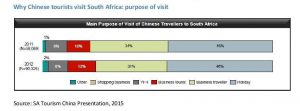
While everyone agrees that the number of Chinese tourists visiting South Africa will increase significantly, unless this growth has a broader economic impact on South Africa’s historically disadvantaged majority, it will only mean that the rich will become richer, thereby exacerbating the country’s economic imbalances.
The question remains, “Can the South African tourism industry afford to continue to ignore its economic transformational obligations for another 15 years, even after the “tourism cake” was increased by the granting of Approved Destination Status to South Africa by China?”
What do you think? Your comments will be appreciated.
Dr. Stacy J (Ph.D.) – Northeastern University of Finance and Economics
Email: enquiry@tourism-excellence.com
This work was produced as a result of a grant provided by the China-Africa Reporting Project managed by the Journalism Department of the University of the Witwatersrand

